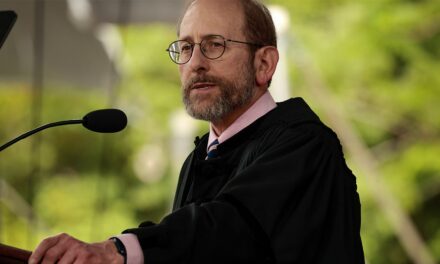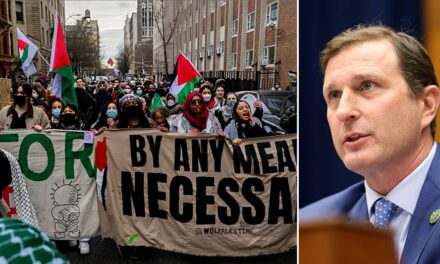In an unexpected revelation, New York City Mayor Eric Adams has publicly acknowledged the existence of what many refer to as the “deep state,” giving credit to the insights presented in a book authored by Kash Patel. This statement has ignited dialogue across political platforms and among citizens, raising crucial questions about transparency, governance, and public trust.
Adams, who has been serving as the mayor since January 2022, made these comments during a recent public appearance where he discussed various political dynamics that influence decision-making in a city as large and complex as New York. Instantly, his remarks began to reverberate beyond the city’s boundaries, stirring both supporters and critics alike.
At the heart of Adams’s assertion is the concept of the deep state—a term often used to describe a network of influence within the government that operates independently of elected officials. While this notion has been a subject of intense debate and controversy, Adams’s acknowledgment seems to lend it a new level of legitimacy, especially given his high-ranking position in one of America’s most significant cities.
In referencing Kash Patel’s book, which has gained traction among conservative circles, Adams positioned himself as someone who values practical insights from various perspectives. Patel, a former chief of staff to the Acting U.S. Secretary of Defense and a vocal critic of the so-called ‘deep state,’ argues in his work that unseen forces can hinder the functions of government and impede accountability. This perspective resonates with some segments of the country, particularly those feeling disillusioned by perceived political corruption.
The mayor’s statements have notably raised eyebrows, especially among progressive groups. Critics argue that Adams’s acknowledgment could be seen as a maneuver to legitimize conspiracy theories that often distract from substantive discussions regarding accountability within public institutions. Progressive voices caution that reinforcing the narrative of the deep state could undermine trust in legitimate governance and public servants who strive to execute their duties effectively.
Moreover, some political experts have weighed in, noting that acknowledging a deep state can have polarizing ramifications. These experts assert that while there may be elements of inefficiency and bureaucratic pitfalls within government agencies, labeling them as manifestations of a deep state can reinforce division within the political landscape. This discourse shines a spotlight on the constant tug-of-war between conspiracy theory and political reality, placing individuals like Adams at the center of an intensely scrutinized narrative.
Patel himself has responded positively to Adams’s sentiments. He expressed gratitude for the mayor’s endorsement of his book, illustrating how influential narratives can sometimes find resonance in unexpected places. Patel’s writings often focus on what he considers a necessary revolution against systemic failings within government structures. The interplay between Patel’s ideologies and Adams’s recent admission has fueled discussions about how public figures navigate the delicate balance of power, accountability, and transparency.
The implications of Adams’s comments stretch beyond just political theory. They strike at the heart of how citizens perceive their government, particularly in a city that has faced numerous challenges, from public safety issues to economic recovery post-pandemic. Many New Yorkers are already grappling with feelings of disenfranchisement and skepticism regarding their leaders, and the mayor’s remarks may only exacerbate these sentiments.
As the conversation surrounding the deep state unfolds, citizens have been encouraged to reflect on what governance means to them. Are public officials acting in the best interests of their constituents, or are there unseen forces that operate independently of democratic will? The deep state narrative resonates differently across varying demographics, with independence-minded individuals often more likely to embrace these concepts, while others may regard them as detracting from genuine concerns around corruption.
The discourse continues to fuel debates on several fronts, particularly in the realms of media ethics and misinformation. Various media outlets have taken contrasting approaches to these topics, with some emphasizing transparency and rigorous journalism, while others have been accused of perpetuating narratives that lack a firm factual basis. The challenge remains in ensuring that the public is equipped with accurate information while also maintaining an open forum for dialogue on governance.
As the mayor of one of the largest cities in the United States, Eric Adams finds himself at the intersection of these discussions. Moving forward, it may be prudent for him to clarify his stance and set the tone for transparency in governance. Anchor points such as accountability, citizen engagement, and government reform resonate deeply, and Adams has a unique opportunity to spearhead initiatives that emphasize doing right by the public.
Future forums, town halls, and public discussions could be beneficial for Adams to reinforce the importance of trust in government while also addressing the rightful concerns of its citizens. Engaging with communities around the issues of political corruption and inefficiency, rather than leaning into narratives centered on the deep state, could pave the way for meaningful reforms.
Furthermore, the interplay between religious beliefs and governmental policies often comes into play in dialogues about moral governance. Citizens need to know their leaders are not only committed but also manage the affairs of the city with integrity and respect for all voices, ensuring the mechanism of democracy runs smoothly. By tackling challenges head-on and showcasing leadership free from conspiracy-laden dialogues, Adams can potentially regain some citizen trust.
In sum, Eric Adams’s admission regarding the deep state has ignited profound discussions around governance, accountability, and perceptions of public institutions. By drawing attention to ideas presented in Kash Patel’s book, he has opened the door to discourse that has ramifications for how citizens view their government. Navigating this complex landscape requires finesse and an unwavering commitment to empowerment through transparency, vigilant engagement, and calls for reform that resonate with New Yorkers from all walks of life.
This landscape showcases the necessity of dialogue in a democratic society while emphasizing the importance of accountability and trust. The forthcoming months will likely see a series of reactions, reviews, and potentially, shifts in how local governance is approached in New York City. All eyes will be on Adams as he shapes a narrative that not only reflects the challenges facing his administration but also restores faith in the institutions of governance.
































